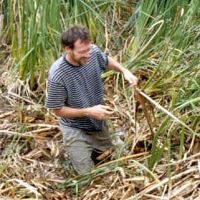Goulden & Bales, 2014
Mountain runoff vulnerability to increased evapotranspiration with vegetation expansion
Goulden, M.L., Bales, R.C. (2014)
Proceedings of the National Academy of Sciences. 111 (39)
-
Sierra, INVESTIGATOR
-
Sierra, INVESTIGATOR
Plain English Summary
Significance
Climate change has the potential to reduce the supply of surface water by accelerating mountain vegetation growth and evapotranspiration (ET), though the likelihood and severity of this effect are poorly known. We used the upper Kings River basin in California’s Sierra Nevada as a case study of the sensitivity of runoff to increased ET with warming. We found that Kings River flow is highly sensitive to vegetation expansion; warming projected for 2100 could increase ET across the Kings River watershed by 28% and decrease riverflow by 26%. Moreover, we found a consistent relationship between watershed ET and temperature across the Sierra Nevada; this consistency implies a potential widespread reduction in water supply with warming, with important implications for California’s economy and environment.
Abstract
Climate change has the potential to reduce surface-water supply by expanding the activity, density, or coverage of upland vegetation, although the likelihood and severity of this effect are poorly known. We quantified the extent to which vegetation and evapotranspiration (ET) are presently cold-limited in California’s upper Kings River basin and used a space-for-time substitution to calculate the sensitivity of riverflow to vegetation expansion. We found that runoff is highly sensitive to vegetation migration; warming projected for 2100 could increase average basin-wide ET by 28% and decrease riverflow by 26%. Kings River basin ET currently peaks at midelevation and declines at higher elevation, creating a cold-limited zone above 2,400 m that is disproportionately important for runoff generation. Climate projections for 2085–2100 indicate as much as 4.1 °C warming in California’s Sierra Nevada, which would expand high rates of ET 700-m upslope if vegetation maintains its current correlation with temperature. Moreover, we observed that the relationship between basin-wide ET and temperature is similar across the entire western slope of California’s Sierra Nevada, implying that the risk of increasing montane ET with warming is widespread.
Citation
Goulden, M.L., Bales, R.C. (2014): Mountain runoff vulnerability to increased evapotranspiration with vegetation expansion. Proceedings of the National Academy of Sciences. 111 (39). DOI: 10.1073/pnas.1319316111
Explore Further


